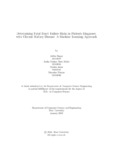Determining fatal heart failure risks in patients diagnosed with chronic kidney disease: a machine learning approach
Abstract
The connection between heart and kidney has been medically established. The presence
of a condition affecting one of the organs impairs the other. Hence, the causal
associations between two of the most long-term conditions: Chronic Kidney Disease
and fatality of Heart Failure are supported by the outcomes of Machine Learning
techniques. The novelty of this research lies in its techniques that successfully find
patterns in on of the stages of Cardiorenal Syndrome. We employed two disease
datasets to perform predictive analysis with five classifiers: Random Forest, XGBoost,
CatBoost, Logistic Regression and Support Vector Machine, and analyzed
the feature importance scores of the models to gauge the relationship between the
conditions. The top predictors in our research were Random Forest, XGBoost and
CatBoost classifiers with accuracy of the models for heart failure ranging from 70%
to 76% and the accuracy for CKD prediction varied from 97% to 99%. Numerous features
of the top predictors of HF and CKD were shared such as serum creatinine and
diabetes. Individually, the CKD dataset ranked highest importance for haemoglobin
levels, the imbalance of which causes anemia, and anemia is a key component in the
HF dataset. The results of the visualization techniques of ML also yielded outcomes
that were medically sound. This analysis of the physiological attributes and their
importance with the help of machine learning, aided in successfully reaffirming the
medical findings of a crucial stage of Cardiorenal syndrome.

